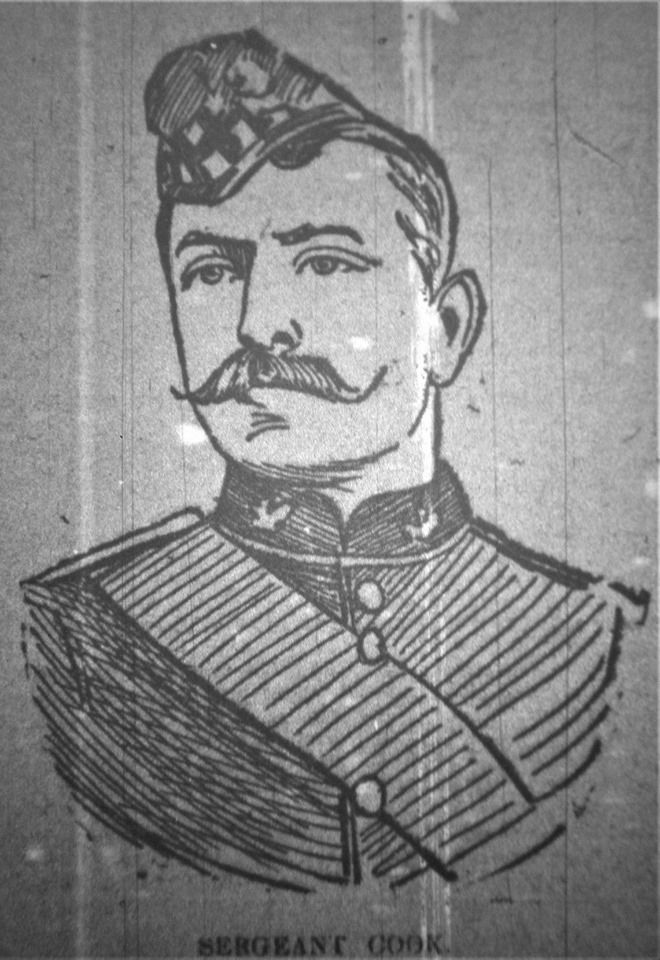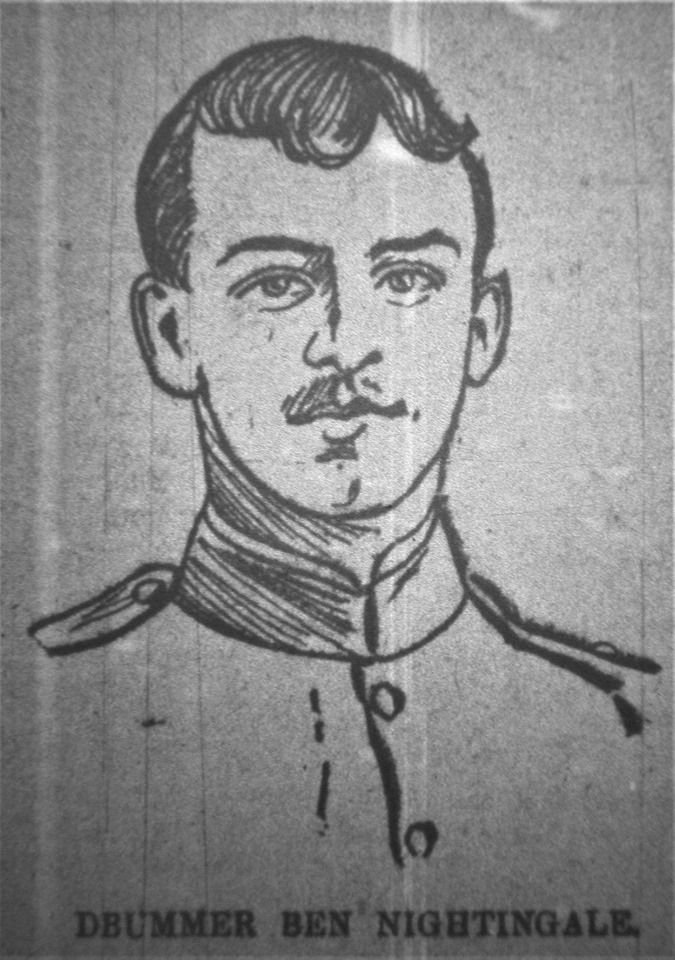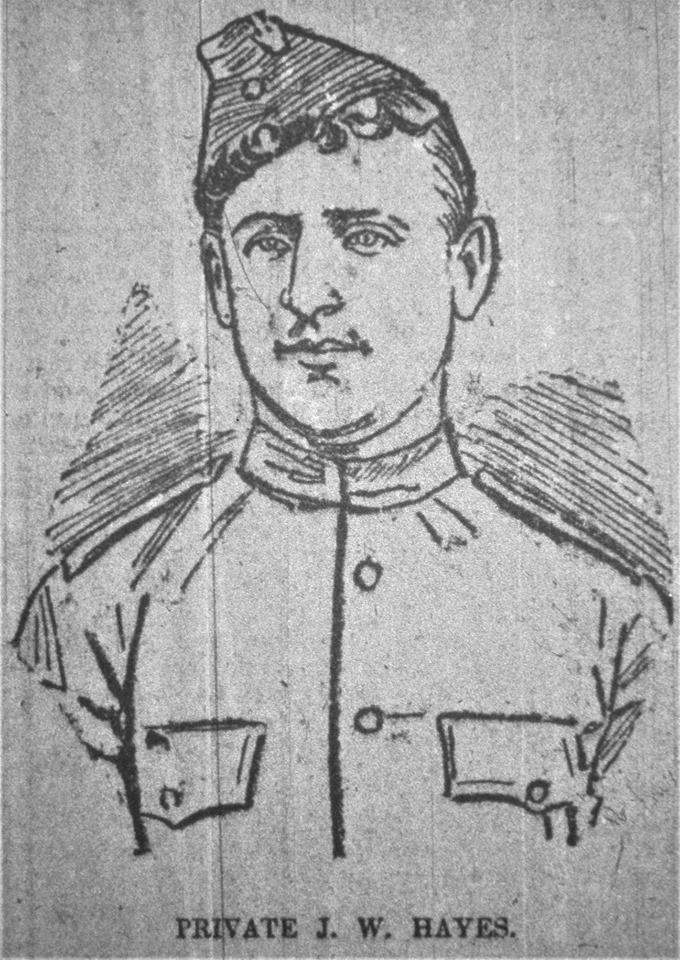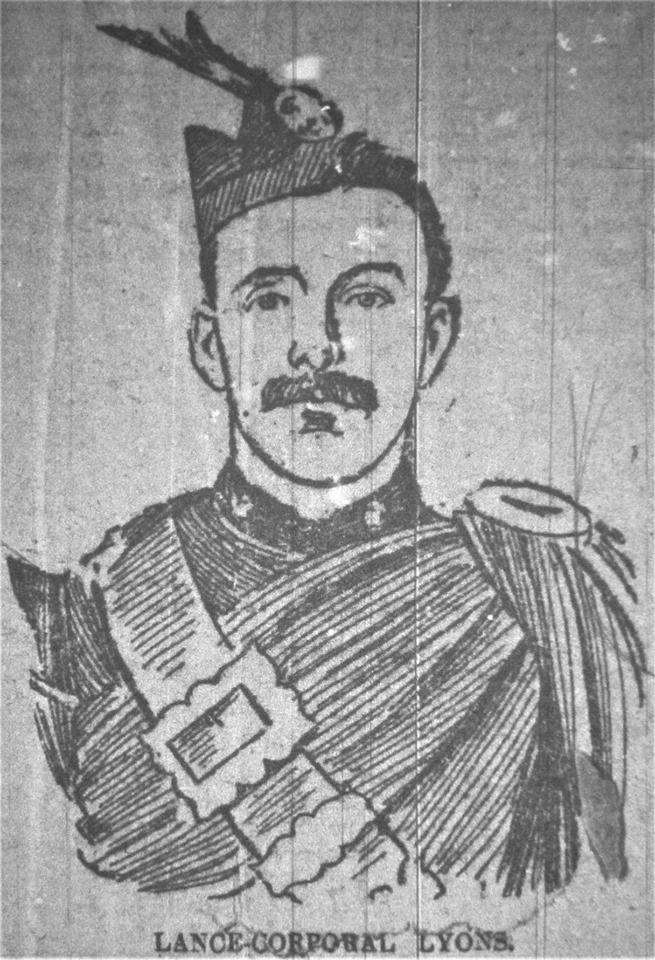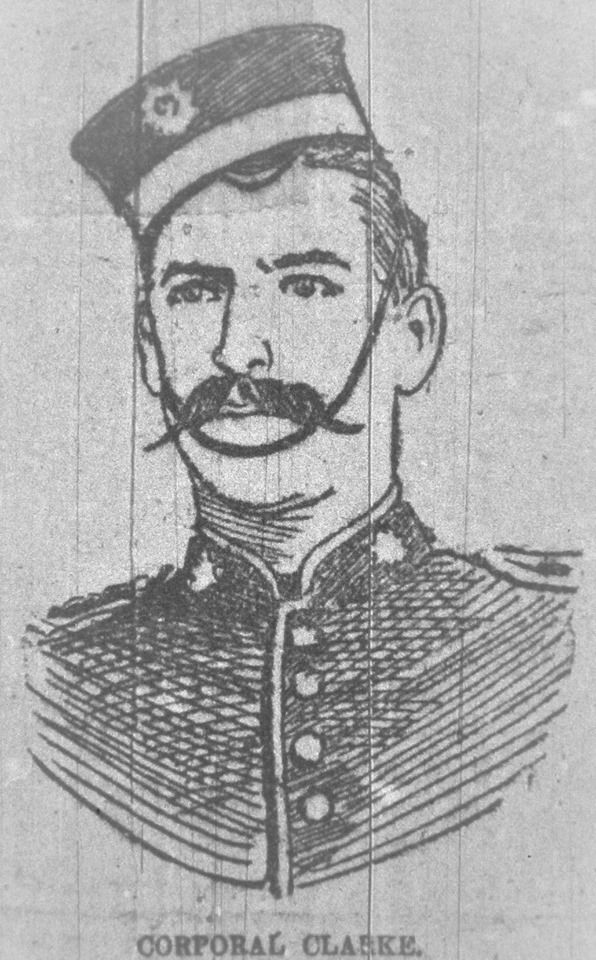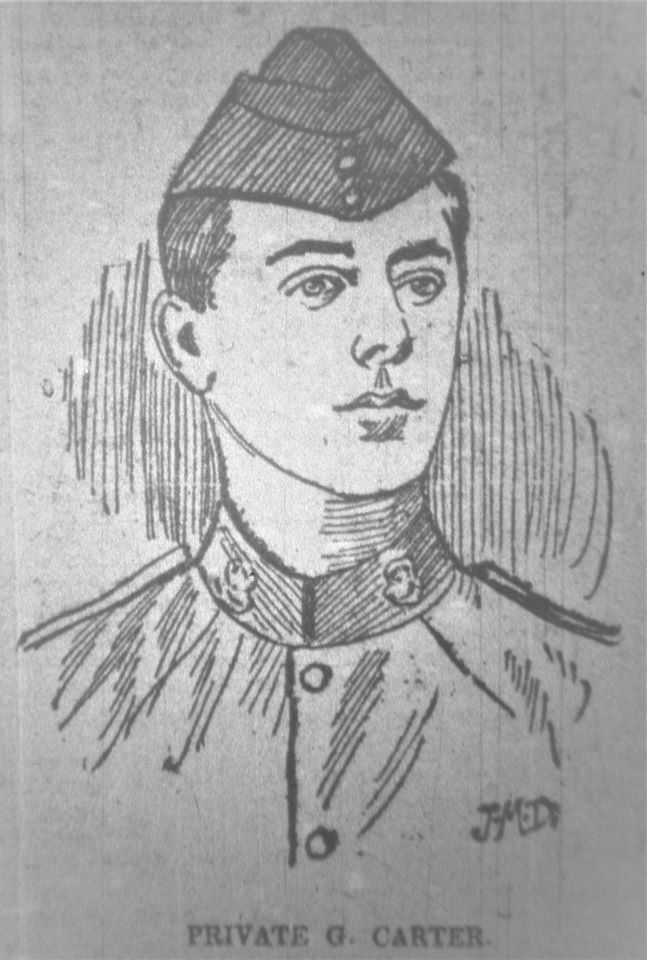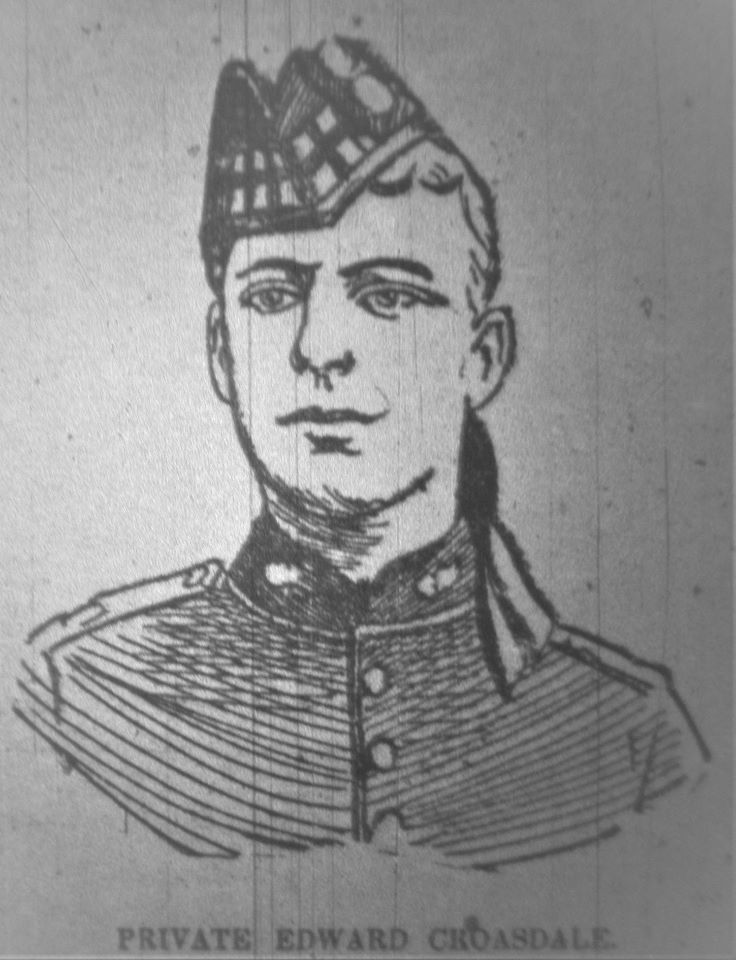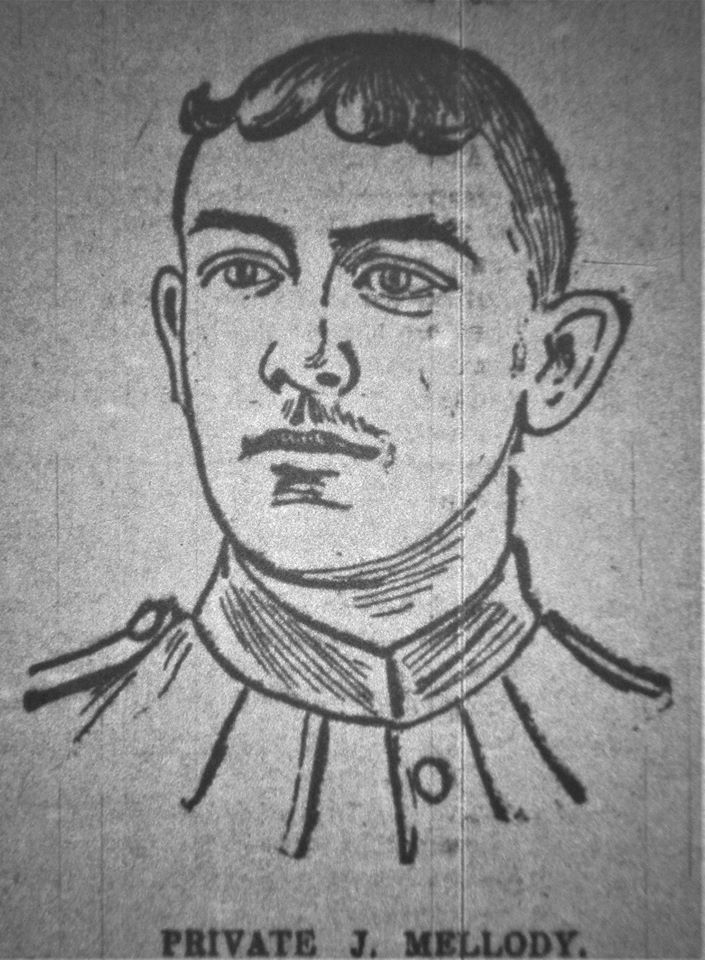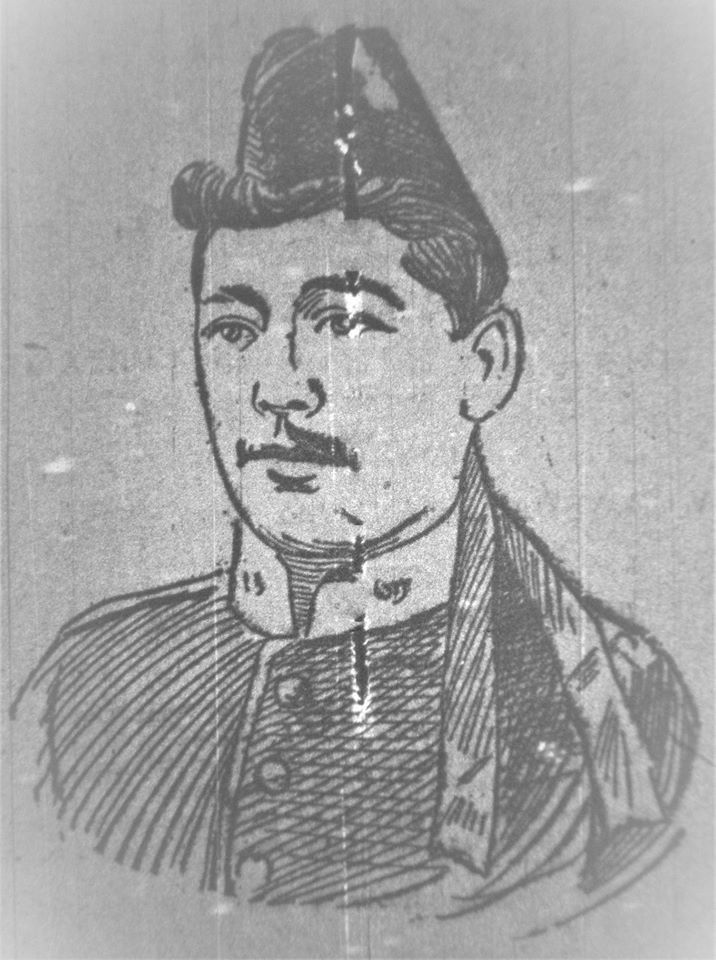|
Welcome,
Guest
|
TOPIC:
Sketches of soldiers in the Blackburn Times 6 years 2 months ago #66678
|
Addresses such as Bank Top, Witton, and Lower Audley are all areas of Blackburn.
Sergeant J. Cook, Royal Scots
WITH GENERAL GATACRE'S FORCE.
Mr. Luke Cook, fish salesman, of 38, St. Paul's-street, Blackburn, has received two letters from his brother, Sergeant J. Cook, of the Royal Scots, with General Gatacre's force, stationed at the time of writing at Penhock. In one, dated February 15th, 1900, he says: -"SHOWERING LEAD INTO THE BOERS. "We have passed an uneventful week, but I think something will turn up before next week. We are getting our cavalry nearer the front every day. We have at the present time about 1,500 mounted men in camp and they are expected to make a move on Dordrecht to-night. The Boers are in very good positions there, but I think with a little determination we can shift them. I was on outpost duty on the 13th when the sentry reported to me that there were two Kaffirs coming towards our lines. I sent two of my men out to meet them and they found them to be two of our spies, and they reported 2,500 Boers in Stormberg, and they will require a great deal of shifting." In the other letter, dated February 21st, from Penhock, he says: - "We had an attack on this place this morning. On the 19th inst. there was a force of about 2,000 Boers with six guns but they hadn't the pluck to come out on the open and fire a shot. They got on top of a ridge of hills about 3,500 yards in front of our position and our artillery was shelling them all the while. I think the Boers must have suffered from the effects of our fire. After our artillery had been shelling them for about two hours my company advanced up to the front of the hill while another company went round their left flank. To our surprise, when we got to the top of the hills, we found the Boers riding away across the plains below. We at once started to shower lead into them for we could not follow up. After a while we retired back to camp. I can assume we did not feel safe as we were crossing the plains, expecting every moment a volley from the top of the ridge." The Blackburn Times, Saturday 24th March 1900
____________________________________________________________
4630 Drummer Ben Nightingale, G Company Loyal North Lancashire Regiment
A BLACKBURN DRUMMER IN KIMBERLEY.
Drummer Ben Nightingale, 4,630, G Company of the Loyal North Lancashire Regiment, writing home from Kimberley to his father at 33, Oak-street, Blackburn, says: -GRAPHIC STORY OF THE SIEGE. A BOER PREDICTION AND ITS RESULT. "You will probably know the reason I have not been able to write sooner. We have been besieged and cut off from the world. I will tell you about it. On Monday morning, the 18th September, 1899, we got orders to leave for somewhere. Where, we did not ourselves know, only the officers. We got packed up and left Capetown the same night about ten o'clock. We set off, thinking every minute we should be fired on. We went on all right till we reached Belmont; then we began to get amongst the proper Boers. Just as our train was leaving the station, one of them said, "You cut-throats, you will never come back." One of our men had a corned beef can in his hand. So he up with it and caught him right between the eyes. The Boer then muttered something in Dutch. I suppose it was something nice. We went on all right until we came to Orange River, when we were ordered to move slowly. Of course, we had a pilot in front of the engine. We pulled through all right, and through, where afterwards the other half of our regiment won itself such a splendid name. I mean at Magersfontein. At the end of our two days and two nights riding we reached Kimberley about 6 p.m. on the 20th of September. Well, every thing went well until they cut the wires, and broke up the rails on the 14th of October. Then the fun commenced. We had four or five little fights trying to keep them from getting too near the town. Well, to cut things short we lost about 50 killed. Of these, our regiment had two killed and about 20 wounded, and 10 died natural deaths. There were plenty of people died through not being able to get nourishment, as after a few weeks of the siege there was nothing to be had, such as butter, milk, eggs, &c. We ourselves lived on horse, donkey, mule, 14oz. of bread, coffee, and Indian corn boiled - no sugar - this for between 10 and 12 weeks. You might think I am piling it on but it is a fact. Other things were frightfully dear whilst they lasted, such as matches 3d. a box, 9d. for about six pipes of tobacco, so I suppose you can imagine what our difficulties were. The men who garrisoned Kimberley were 450 of the Loyal North Lancashires, 50 of the Royal Engineers, and about 100 garrison artillery. This made about 600 Imperial troops. Then they formed a Town Guard of the civilians. They were not of much use, as they never went out to face the enemy, but they used to man the defences when we went out. Then we had a few volunteers, and some men who formed a company of the Light Horse. We had to show them how to go about it. So you see what a fix we were in for a fighting force. We had only 7lb. guns, the least in the service. You may think what good they were when we could not reach the Boers with them from town. We used to go out to have a bit of a do with them until they got the town properly surrounded; then they showed their bravery by shelling the town. They started one day at 3 a.m., and left off at 12 a.m. the day after. They had six guns round the town, and at the end of the two days they had put about 1,100 shells in town. We made a 28-pounder of our own at De Beers Foundry, which was successful for a while, until the Boers were reinforced with about 5,000 men and a 6-in. gun. Then the trouble commenced. They started to fire on the town with it about 10 a.m., and kept it up until General French relieved us about seven or eight days later. It got unbearable. It set a big shoe shop on fire, and killed about five persons. One was the man who had made the 28-pounder. The shell came through the roof of the Grand Hotel where this man was staying, and knocked his head off. It was pitiable to see a population of about 40,000 women and children running every time they heard this big gun fire. We had to put them down the mine. There were ten or twelve thousand Boers round us, and if they had had pluck, they might have eaten us up - might, but they would have had to fight for it. The last day but one of the siege we were called out to a place called Alexandrafontein, and there was the hardest bit of fighting I have been in. We had rifle fire in front, and shell fire behind, but we pulled through. At two o'clock the day after we saw the dust rising over the hills. We thought at first it was the Boers, until we saw some of them. Then, didn't we shout. I punched my helmet, and stood on my hands. You would have thought I was going mad. The Boers ran off, and there was not one to be found within ten miles of Kimberley. the trouble ceased then for the civilians; I don't know proper about us yet. General French and his cavalry relieved us on the 15th February, then the trains started coming in with food stuffs, and to-day we got full rations, and things are looking up a bit. I don't know whether we shall stop here or not. All the battalion are together now. After the war we expect to come home directly. Lord Roberts is doing good work, we hear to-night that he has almost got Cronje surrounded, and the free Staters are almost done up with now. We are about the last troops to get served with the presents from home. To-morrow we get the Queen's chocolate and other things. I am hoping to see you all again in Blackburn, so roll on time, if I don't get shot. The Blackburn Times, Saturday 24th March 1900
The following user(s) said Thank You: djb
|
|
Please Log in or Create an account to join the conversation. |
Sketches of soldiers in the Blackburn Times 6 years 2 months ago #66697
|
Private John W. Hayes, C Company 1st Battalion Loyal North Lancashire Regiment
"OUR LITTLE AFFAIR AT BELMONT."
Mrs. Richard Sharples, confectioner, 74, London-road, has received the following letter from her brother, Private J. W. Hayes, No. 4,658, C Company, 1st Battalion Loyal North Lancashire Regiment, (dated from the camp at Orange River (Nov. 29), in which he states that he has been in the hospital suffering from blood poisoning, but is now all right. He then goes on to say: -"We have about 3,000 soldiers here now, the last lot arriving this morning. Last Wednesday our mounted infantry and one company went out along the railway for six miles and captured a Boer spy, a horse, five rifles, and 500 rounds of ammunition. There are thousands of Boers at Belmont, and they have pulled the railway lines up between here and Kimberley, which is 70 miles distant. They are lying in wait for us about 20 miles from here, but we are not going to move till we get more artillery. The spy is handcuffed, and a guard kept over him. The 9th Lancers are with us, and the Reserves of the 2nd King's Royal Rifle Corps. We are quite safe, and the place is well defended. I see that the second battalion of ours has gone to Malta. I think we shall be coming home after this affair is over - about next March, I think - and if I pull through I will extend my services for an extra five years, that is 12 in all, and then if it suits me I will finish my 21 years. Our men are itching to get at the Boers, and waiting for the time to pay old debts off. An officer of another regiment said our company seemed to be more on a playground than a battlefield, so light-hearted the men seemed. In our little affair at Belmont one of our officers was shot twice - once in the head, and once in the chest, but he lived till 7 30 in the evening. We had only two killed and five wounded. We have been strengthened since then by 8,000 men, composed of the Coldstream Guards, and other regiments and infantry, and we are going to make a clean sweep of the Boers from here to Kimberley, so that we can relieve half our regiment, which is there. I feel quite comfortable, and think I shall pull through; if not, what things I have left and the remainder of my deferred pay (about £10) I have signed over to you. We have had only one dash at the Boers yet, although we have been here eight weeks. I wish we were fighting them every day. They are doing more damage to officers than men, because there is one of them to every 50 soldiers on active service. When you are spending Christmas I expect to be shooting the Boers, but God knows whether they will be women or men, as it has been found they have women fighting with them. The most important points on our route will be Belmont, Modder River, and Spyfontein. Of course you will have read the account of our little action at Belmont last Friday, as it will be in the papers. Please send me a copy of the "Blackburn Times" every week until the war is finished, as lots of our men are eagerly waiting for it. Hoping to send you good news in my next, - Yours, &c.,
John Hayes.
The Blackburn Times, Saturday 6th January 1900
____________________________________________________________
653 Private J. Houghton, 1st King's Royal Rifle Corps
A BLACKBURN MAN KILLED AT GLENCOE.
Mr. Thomas Houghton, of 46, Hollin Bridge-street, Blackburn, overlooker at Bannister Brothers' Pump-street Mill, whose eldest son was in South Africa not long ago, received intimation from the War Office to the effect that his son, Private (653) J. Houghton, of the 1st King's Royal Rifles, of whom we give a portrait, was severely wounded at the battle of Glencoe. He was then taken prisoner, and it has since been reported in the papers that he has died of his wounds while a prisoner at Pretoria. He was only 20 years of age, and was a native of Blackburn.The Blackburn Times, Saturday 20th January 1900
The following user(s) said Thank You: davidh
|
|
Please Log in or Create an account to join the conversation. |
Sketches of soldiers in the Blackburn Times 6 years 2 months ago #66713
|
2523 Lance Corporal William Lyons, 2nd Royal Scots Fusiliers
WOUNDED AT COLENSO.
Mrs. Lyons, of 110, Hollin Bridge-street, has been informed by the War Office that her husband, aged 38, Lance-Corporal William Lyons 2,523, of the 2nd Battalion Royal Scots Fusiliers, was wounded at the battle of Colenso, whilst serving under General Barton. He has sent several letters home to his wife, a few of which we reproduce below. In a letter dated November 23rd, from the Mooi River, he says: - We landed at Durban on the 16th, and we are now in trenches with the Boers firing on us. We are all surrounded as you will have seen by the papers. We expect to advance every moment. A shot just came over now.In another letter dated November 26th, from the Mooi River Camp, he says: - We left the trenches on Saturday morning and drove the Boers out of here. We returned this morning at 5 o'clock. So we are expecting a good sleep, for goodness knows we deserve one. We have only had one night's sleep since we have been here, and we have not had our clothes off yet, nor our shoes. We start to-morrow for Estcourt, then to Ladysmith. We have only lost two men belonging to the Devonshire Regiment, and three men of the Mounted Infantry. A wash and a shave are strangers to us, and I have whiskers now, and I don't think you would know me. The General told our Colonel to-day that we had behaved splendidly. The Colonel said he was proud of us. I am dying for a sleep and wash, and change of clothes. I think this war will soon be over. In another letter dated November 30th, from General Buller's camp at Estcourt, he says: - We at last managed to get out of the camp at Mooi River. We had a rough job of it. We made the Boers retreat and came on here to Estcourt, and it was something cruel, for we had to march it in full marching order, besides carrying 200 pounds of ammunition with us. It is midsummer her, and we shall have to stay here a day or two, as the Boers have blown up a bridge which we had to cross, and cut us off, so we have to repair it before we can get our heavy baggage across. Then we march on to Colenso, 28 miles from here, then up to Ladysmith, 25 miles further on. We are expecting a big fight at Colenso, but you will have seen the report about it in the papers before you receive this letter. We have with us the Royal Irish Fusiliers, the Welsh Fusiliers, and the 7th London Fusiliers. That is why they call us the Fusilier brigade. In another letter, dated December 8th, 1899, from Estcourt, he says: - We leave here in the morning for Colenso, where we expect to have a big fight. We are expecting being in it. There are twenty thousand troops here ready for marching away. I am in the best of health, but not as fat as I was. The Blackburn Times, Saturday 6th January 1900
____________________________________________________________
9235 Corporal J. H. Clarke, 1st Coldstream Guards
IN THREE BATTLES UNINJURED, BUT WOUNDED AT MAGERSFONTEIN.
Mrs. Clarke, of 107, Mosley-street, Blackburn has been notified by the War Office that her husband, Corporal J. H. Clarke (9,235) of the 4th Company 1st Batt. Coldstream Guards, was wounded at the battle of Magersfontein, on the 11th of December, 1899. The following are letters received by Mrs. Clarke from her husband: - It is 600 miles from Capetown to this part of the Orange River, where we are stationed, but it only took us two days. We have had to travel in the train very carefully, for the Boers keep blowing up the bridges and the rails. There are several regiments camped here, besides the Guards. We have also with us the Black Watch. Where we are at present is on the banks of the Orange River, which borders Cape Colony from the Orange Free State and the Transvaal. We leave here shortly for Kimberley, which is further up in the country. I think it is the intentions of the Generals to have the Guards at the very front this time. They have been pushing us up all the time, and we haven't hardly had time to eat our food properly. Telegrams keep coming, "Forward the Guards without delay." I believe that all the divisions will all meet before long at Pretoria.In another letter, under date December 4th, 1899, he says: - We had a stiff engagement at Belmont, as I have already told you. We had also another battle on 25th of November, and still another on the 28th at Modder River. The Boers were many thousands strong. The battle started at early dawn, and the firing lasted until dusk. I shall remember it all my life. The enemy had a nearly impregnable position on the hills and the river bank. As we advanced towards the hills a hail of bullets and shells burst among us, and hundreds were wounded and hurled into eternity. It was a most dreadful sight and one which I shall never forget. Horses were lying about shot. The wounded were lying in their own blood, and the killed, some with the top of their heads blown off, and others with their stomachs hanging out with the enemy's shell, presented a fearful spectacle. We have had three battles in five days. The division I belong to is under General Lord Methuen, formerly of the Guards. I must think myself lucky, having been through three engagements, and have not as yet had the slightest injury, whilst others were falling thick and about me. I hope you will let me have the "Blackburn Times" occasionally. The Queen has sent two messages out here, congratulating us for the gallant fighting we have done. The Blackburn Times, Saturday 6th January 1900 |
|
Please Log in or Create an account to join the conversation. |
Sketches of soldiers in the Blackburn Times 6 years 2 months ago #66737
|
5598 Private George Carter, 1st Border Regiment
WEARING DEAD BOERS' SOCKS.
No. 5,598 Private George Carter, of the "D" Company 1st Border Regiment, Natal Field Force, and whose photo we reproduce, sends some interesting letters to his sister, who resides in Lower Audley. He says: - "We stopped at Pietermaritzburg for a week. There we got an order to pack up and go to Estcourt, which is six miles from Colenso. I went up in the armoured train, but we had to turn back, because they had a big gun on the line. This gun was facing the armoured train. We have to pay sixpence for a cigarette, and a shilling for a tin of jam containing one pound. We do not think of sleeping on this job. It is four or five days since I had a wash. It is bully beef and hard biscuits every day till the war is over.In another letter from Frere Camp, he says: - "We have had a big fight at Estcourt. There were 13 killed of our army. Our regiment and the artillery were the last to leave the battlefield. Our troops have to wear the socks taken from the dead Boers. The Boers keep firing on our camp with their big Long Tome. One of our shells killed 19 Boers. Our troops captured 50,000 rounds of ammunition and 170 shells. We have got in communication with Ladysmith. We captured three prisoners the day we landed here." In another letter from Estcourt, he says: - "We are having a rough of it. We have to sleep out all night in the rain. We were on outpost duty five miles off Colenso, where the fighting was going on. We were in the armoured train on Monday, and the Boers fired at us. Of course, we fired back. Our company tried to drive them from the rocks, but were unsuccessful. The Dublin Fusiliers got captured whilst trying to drive the Boers away. Joubert is going to raise a great army in the Transvaal. We are about 18 miles from Ladysmith. We are having bad weather out here."
"CANNOT BE TRUSTED IN THE DARK."
In a further letter from General Buller's camp, dated December 6th, he says: - "I have got a bad cold through being in the rain and hailstone. The hailstones came down as big as my fist. We were surrounded by the Boers at Estcourt, and we had to fight our way. The Border Regiment, the Durban Light Infantry, and the Natal Royal Rifles occupied Beacon Hill, supported by the 7th Battery of Artillery. Our losses are estimated at 42 killed and wounded, General Hildyard being among the latter. Our regiment lost no men at all. I asked a Boer if he knew that the 'sun never sets on the British Empire.' 'Oh!' replied the Boer, 'that shows that the British are a bad lot, for they cannot be trusted in the dark.' We keep making the Boers retreat, as we advance towards the relief of Ladysmith. We shall soon see the Union Jack flying over Pretoria, I can tell you. Our naval guns knocked the Boers' Long Tom into atoms.The Blackburn Times, Saturday 13th January 1900
____________________________________________________________
Private Edward Croasdale, 2nd Royal Scots Fusiliers Mr. A. Croasdale, of Bank Top, has received a letter from his son, Private Edward Croasdale, of the G Company 2nd Batt. Royal Scots Fusiliers. The letter is under date December 15th, and is from Frere Camp. He says: - "We landed in South Africa on the 27th of last month, and marched on the battlefield as soon as we got to the Mooi River. We had none killed of our battalion. We stayed here till it was quiet, and then we marched to a place called Estcourt. We turned out there, but all seemed very quiet. The distance we marched would be about 21 miles, and I can tell you I was ready to have a sleep. We moved from there to a place called Frere, where we are now stationed. We never know when we will move. I suppose you have read about the war, but reading and being there are two different things altogether. I haven't had my clothes off since the 27th of November. We are given one blanket for two men. The people at Durban treated us well, they gave us pipes, tobacco, matches, eatables, and really more than I can think of. We have to rise at three and four o'clock in the morning. I must tell you that I saw Billy Turner of the Medical Staff out here, and all the boys from Bank Top and Witton met together." The Blackburn Times, Saturday 20th January 1900
____________________________________________________________
Private Davies, Royal Welsh Fusiliers Private Davies, of the Welsh Fusiliers, whose portrait we give above, is reported to have been wounded at Modder River. He is a Blackburn man. The Blackburn Times, Saturday 20th January 1900 |
|
Please Log in or Create an account to join the conversation. |
Sketches of soldiers in the Blackburn Times 6 years 2 months ago #66766
|
4591 Private John Mellody, 2nd Lancashire Fusiliers
ANOTHER BLACKBURN VICTIM OF SPION KOP.
Mrs. Mellody, of Wensley Fold, Blackburn, has received intimation from the War Office to the effect that her son, No. 4,591 Private John Mellody, of the 2nd Lancashire Fusiliers, was wounded during the storming of Spion Kop. Private Mellody, who is twenty-three years of age, joined the army seven years ago. He was engaged in the Soudan campaign, under General Kitchener, and fought at the battle of Omdurman. He has sent a letter to his mother from the American Hospital ship "Maine" in which he says he is doing nicely and being well treated. He also mentions that his wound is healing, and he expects to be home some time this year.The Blackburn Times, Saturday 27th January 1900
____________________________________________________________
4632 Private Michael Henry Reed, 2nd Lancashire Fusiliers
PRIVATE REED KILLED IN ACTION.
Private Michael Henry Reed, who was reported in yesterday's papers to have been killed in action last Saturday with General Woodgate's division, is a native of Bacup. He was a collier up to six years ago, when he enlisted in the 2nd Lancashire Fusiliers. Since then his parents have removed to Rishton, and live at 15, Chapel-street. Private Reed had been in two campaigns previous to the present war, and held two medals, one for the second Soudan campaign. He was just under 25 years of age, and was unmarried. It is four years since he left England for service abroad, and he had not been home during that time. He belonged to "C" Company of the 2nd Lancashire Fusiliers, and when he received his fatal wound was taking part in the series of attacks made upon the Boers in front of Spion Kop.The Blackburn Times, Saturday 27th January 1900 |
|
Please Log in or Create an account to join the conversation. |
Sketches of soldiers in the Blackburn Times 6 years 2 months ago #66798
|
Hi Berenice.
You've come up trumps for me again! I have the QSA clasp Talana to 653 Pte. J. Houghton KRRC. The write up in the Blackburn Times contains a notable error though. Houghton wasn't taken prisoner and didn't die of wounds at Pretoria. He died of wounds at Dundee 2/11/1899 and is buried at the Swedish Wesleyan Church there. He's commemorated on the memorials at the church and at St James's Church also in Dundee as confirmed on a visit there.. He has no surviving grave marker. I didn't know he was from Blackburn. The portrait is great. Thanks again. Kind regards David |
|
Please Log in or Create an account to join the conversation. |
Moderators: djb
Time to create page: 0.108 seconds
- You are here:
-
ABW home page

-
Forum

-
Research and genealogy

-
Genealogy and family research

- Private T. W. Cottrell, Durham Light Infantry - invalided home, died 18.1.1902

